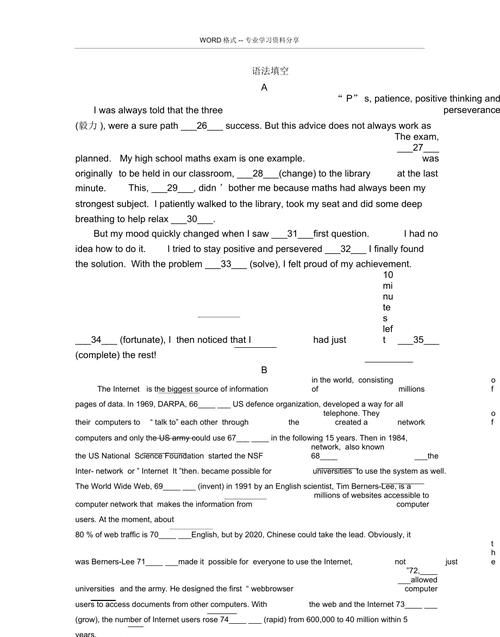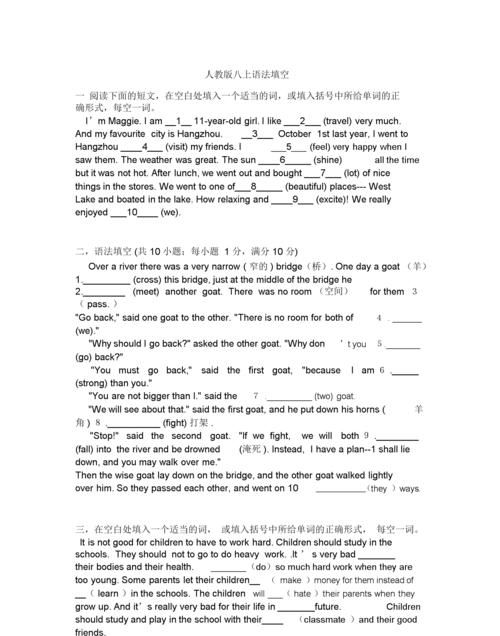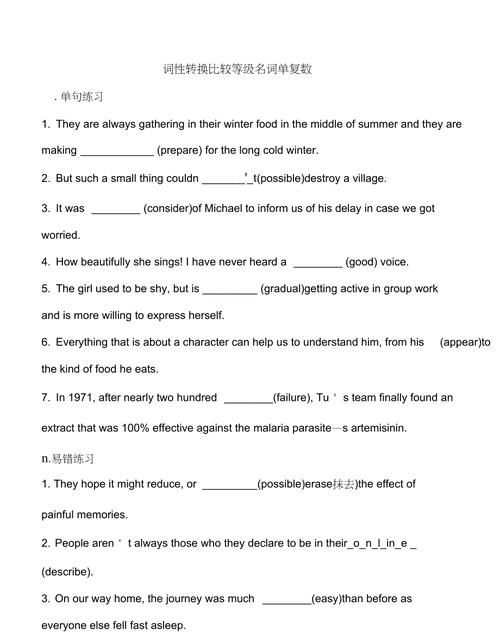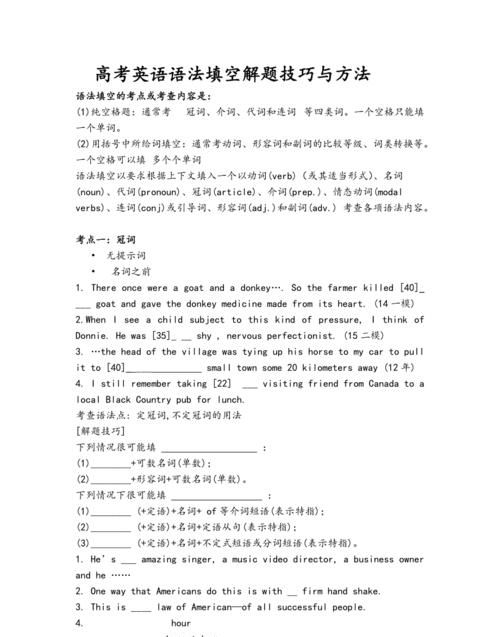本文目录
高考英语语法填空之动词考点
动词是一类词性,一般就是用来表示动作或状态的词汇。在英语中,动词按作用和功能主要分为两大类,一类是谓语动词,另一类是非谓语动词。我在这里整理了相关资料,希望能帮助到您。
高考英语语法填空动词知识点
动词概说
1)动词(verb)是表示动作或状态的词。
a)表示动作:swim游泳push推
b)表示状态:have有be是
2)英语动词有时态、语态、语气等形式上的变化。
限定动词和非限定动词
从是否被主语所限定来分,动词有限定动词(finite verb)和非限定动词(nonfinite verb)两大类。
1)限定动词 限定动词用作句子的谓语动词,并被主语所限定,有人称和数的变化。如:
He is a tractor driver.他是一个拖拉机手。
Facts are more eloquent than words.事实胜于雄辩。
We have friends all over the world.我们的朋友遍天下。
An apple falls by the force of gravitation.地心吸力使苹果落地。
2)非限定动词 非限定动词有动词不定式、动名词和分词三种,在句子里都不能单独作谓语动词,故不被主语所限定,没有人称和数的变化。如:
I am pleased to meet you.我很高兴与你相识。(动词不定式)
Smoking is harmful to the health.吸烟对身体有害。(动名词)
I heard them singing the Internationale。我听见他们唱《国际歌》。(分词)
Spoken words are often more powerful than writing.语言往往比文字更有力。(分词)
实义动词、连系动词、情态动词和助动词
从其含义来分,动词有实义动词(notional verb),连系动词(1ink verb),情态动词(modal verb)和助动词(auxiliary verb)四类。
1)实义动词 实义动词有完全的词义,并能独立作谓语动词。如:
The sun shone brightly this morning.今天早晨阳光灿烂。
He likes to go for a long walk on sundays.他喜欢星期日出去作长距离散步。
We have a big TV set in the club.我们俱乐部有台大电视机。
2)连系动词 连系动词在句中作谓语动词,后面跟表语。英语连系动词有be(是),seem(似乎),look(看来),keep(保持),become(变成),get(变得),grow(变得),feel(感到),turn(变得,变成),appear(显得),remain(仍旧是)等。如:
It is never too late to mend.改过不嫌晚。
It was a close game.那场球赛比分很接近。
The children in this nursery look very healthy.这个托儿所的孩子看起来都非常健康。
Keep quiet,please!请安静!,
The tape recorder seems all right.这台录音机好像没有毛病。
Later he became a doctor.他后来成为一名医生。
The problem remained unsolved until last year.问题到去年才解决。
[注一]下面句子中的come和go也是连系动词。如:
The old man's dream has come true.这位老人的梦想实现了。
Something has gone wrong with the truck.卡车出毛病了。
[注二]有些连系动词如seem, appear等后面常跟to be。如:
The new text seens to be easy,but actually it is rather difficult.这篇新课文好像很容易,其实相当难。
She appears to be the girl's sister.她似乎是那女孩的姐姐。
3)情态动词 情态动词有can (能),may (可以,也许),must(必须)等及其过去式could,might等,表示能力、义务、必要、猜测等说话人的语气或情态。情态动词只能和主要动词一起构成谓语动词。
[注]关于情态动词详见第十一章。
4)助动词 助动词有shall,will,have,be,should,wonld, do等。它们只能和主要动词一起构成各种时态、语态、语气等动词形式,以及否定和疑问等结构中的谓语动词。
及物动词和不及物动词
从是否需要宾语来分,实义动词又有及物动词和不及物动词两类。
1)及物动词 后面必须跟宾语意义才完整的实义动词,叫做及物动词(transitive verb)。如:
I believe that the committee will consider our suggestion.我相信委员会将会考虑我们的建议。
"How long can I keep the book ?"Harry asked.哈里问:"这本书我可以借多久?"
Dr. Bethune set us a good example. 白求恩大夫给我们树立了好榜样。
Crude oil contains many useful substances.原油含有许多有用的物质。
2)不及物动词 本身意义完整后面不须跟宾语的实义动词,叫做不及物动词(intransitive verb)。如:
Birds fly.鸟会飞。
It happened in June 1932.这件事发生于一九三;年六月。
My watch stopped.我的表停了。
She spoke at the meeting yesterday evening. 她在昨天晚上的会上发了言。
3)兼作及物动词和不及物动词 英语里有不少实义动词可以兼作及物动词和不及物动词。这样的动词又有两种不同的情况:
a)兼作及物动词和不及物动词时,意义不变。试比较:
Shall I begin at once?我可以立刻开始吗?(begin作不及物动词)
She began working as a librarian after she left school.她毕业后当图书馆管理员。(began作及物动词)
When did they leave Chicago?他们是什么时候离开芝加哥的?(leave 作及物动词)
They left last week. 他们是上周离开的。(left 作不及物动词)
b)兼作及物动词和不及物动词时,有时意义不尽相同。如:
Wash your hands before meals.饭前要洗手。
Does this cloth wash well? 这布经得起洗吗?
4) 与汉语的比较 有时英语动词的及物和不及物的用法,与汉语的用法不一样,请注意下列两种情况:
a)有的动词在英语里只能用作不及物动词,而汉语则可用作及物动词,如arrive到达,agree同意,1isten听。英语里这些动词后面常接介词。如:
We arrived at the railway station at noon.我们于中午到达火车站。(at不能省去)(比较:We reached the railway station at noon.)
Everybody listened to the lecture with great interest.每个人都很有兴趣地听讲课。(to不可省去)(比较:We all heard the lecture.)
Do they agree to the plan?他们同意这个计划吗?(to不可省去)
b)有的动词在英语里能用作及物动词,而在汉语里则不能用作及物动词,如serve为…服务。
Our children are taught to serve the people wholeheartedly.我们的儿童被教以全心全意为人民服务。
短语动词
动词常和某些其他词类用在一起,构成固定词组,形成所谓短语动词(phrasal verb)。和动词一样,短语动词也可分为及物和不及物两种。短语动词可以作为一个整体看待,同一般动词一样使用。
1)动词 + 介词 这类短语动词用作及物动词,后面须跟宾语。如:
The small boy insisted on going with his parents.那男孩坚持要跟父母一起去。
Do you often listen to broadcasts in English? 你常听英语广播吗?
Look at the children. Aren't they lovely?看着这些孩子们。他们多么可爱呀!
We stand for self-reliance.我们是主张自力更生的。
这一类的短语动词还有很多,如depend on (upon)(依*),wait on (服侍),look for (寻找),deal with(对待),look after(照料),wait for(等待)等。
2) 动词+副词 这类短语动词有的用作及物动词,有的用作不及物动词。如:
I always get up as soon as the bell rings. 我总是一打铃就起床。(不及物)
Look out,there's a car coming! 当心,来汽车了!(不及物)
Have you handed in your exercises already? 你已经交练习了吗?(及物)
Please don't forget to put on your coat;it's cold outside.请不要忘记穿外衣,外面很冷。(及物)
这一类的短语动词还有很多,及物如 put out (扑灭), eat up (吃光),putdown(放下);不及物如set off (出发),come up(走近),go on(继续)。
[注一] "动词+副词"这类短语动词和上面第一类"动词 + 介词"的不同之处在于:"动词+ 介词"用作及物动词,后面须跟宾语。"动词 + 副词"则有的及物,有的不及物;用作及物动词而宾语为人称代词或自身代词时,副词往往放在宾语之后。如:
Please wake me up at five tomorrow.请在明天早上五点唤醒我。
If you have done your exercises,please hand them in.如果你们练习做完了请交来。
She doesn't normally behave like that;she's putting it on.她通常并不如此表现,她是装出来的。
[注二] 这类短语动词有不少可兼作及物和不及物动词用。如:
He took off his hat when he entered the office.
他进办公室后脱下帽子。(及物)
The plane took off at seven sharp.
飞机在七点整起飞。(不及物)
Charlie rang up Neil to ask about the time of the meeting.
查理打电话给尼尔问开会的时间。(及物)
If you can't come,please ring up and let us know.你如来不了,请来电话告诉我们一声。(不及物)
3) 动词 + 副词 + 介词 短语动词"动词 + 副词"之后有的可以再加一个介词,形成另一种短语动词。这类短语动词用作及物动词。如:
Do not give up hope. We must go on with the experiment
不要失望。我们必须继续试验。(go on with继续)
He came up to me.他走到我跟前。(come up to走近)
这类短语动词还有:look down upon(看不起),do away with(去掉),put up with(忍受)等。
4)动词 + 名词 + 介词 这类短语动词也是及物的。如
He shook hands with all the guests at the banquet.他在宴会上和宾客一一握手。
Young pioneers often come to the Children's Palace to take part in after=school activities. 少先队员经常到少年宫来参加课外活动。
Pay attention to the temperature of the stored rice.注意仓库里的稻谷的温度。
Her job is taking care of the babies.她的工作是照顾婴儿。
这一类短语动词还有:put an end to (结束),take notice of (注意),catch hold of (抓住),lose sight of(看不见),make use of(利用)等
动词的基本形式(principal forms of the verb)
1) 英语动词的四种基本形式 它们是动词原形(room form of the verb),过去式 (past tense form), 过去分词 (past participle)和现在分词 (present participle)。这四种形式和助动词一起构成动词的时态、语态和语气。
原形 过去式 过去分词 现在分词
work worked worked working
write wrote written writing
have had had having
do did done doing
2) 动词原形 动词原形就是词典中一般给的动词的形式,如be,have,do,work,study等。
3)动词过去式和过去分词的构成有规则的和不规则的两种。规则动词(regular verb)的过去式和过去分词,由在原形后面加词尾-ed构成。
[注] 少数双音节动词,尽管重音在第一个音节,仍双写末尾的辅音字母,然后再加-ed。如:
5travel-traveled 5level-1evelled
5total-totaled 5model- modelled
但美国英语不双写辅音字母,如travel-traveled。
不规则动词(irregular verb)的过去式及过去分词的形式是不规则的。这些动词为数虽不多,但都是比较常用的,必须熟记。不规则动词表见本书附录一。
4)动词的现在分词 由动词原形加词尾-ing构成。
其构成方法如下:
a)一般情况下,直接加 -ing:
go-going 去 stand-standing站立
study-studying学习 be-being是
see-seeing看
[注一] 和名词复数、动词第三人称现在一般时加-s(-es)不同,动词末尾如为"辅音字母 + y"时,y不变,其后直接加-ing。如studying [5stQdiiN],fly - flying [5flaiiN],carry-carrying [5kAriiN]。
[注二] 动词结尾为辅音字母r时,加-ing,r在此必须发音。如:
enter [5entE] -entering [5entEriN]进入
wear [wZE] - wearing [5wZeriN]穿
b)以不发音的e结尾的动词,去掉e,再加-ing。如:
come-coming 来 write-writing写
take-taking拿 become-becoming变成
c)动词是闭音节的单音节词,或是以重读闭音节结尾的多音节词,而末尾只有一个辅音字母时,这个辅音字母须双写,然后再加-ing。如:
Sit-sitting坐 run-running跑
Stop-stopping 停止begin-beginning开始
admit-admitting 承认 forget-forgetting忘记
[注一] send,think,accept等动词虽是闭音节或以重读闭音节结尾,但末尾有一个以上的辅音字母,因此,这个辅音字母不双写,应直接加 -ing。如:sending,thinking,accepting。
[注二] 少数双音节的动词,重音在第一音节,仍双写末尾的辅音字母,然后再加-ing。如:
5travel-traveling 5level-levelling
5total-totaling 5model-modelling
美国英语不双写辅音字母,如travel-traveling。
d)少数几个以-ie止结尾的动词,须将ie变作y,再加ing。如:
die-dying死, tie-tying捆,缚,系
lie-lying躺,说谎
[注]少数以-c结尾的动词变为过去式和现在分词时,须先将-c变为ck,然后再加 -ed或-ing。如:
picnic picnicked picnicking
traffic trafficked trafficking
高考英语语法填空题与答案
Last year, my brother and I went to Miami for a vacation. Some of my friends who had been there before said 16 was a wonderful holiday destination. Before we went, we had planned for months. When the day came, we were ready.
After our plane landed, we went to the hotel. We had made our reservation six months__17____ (early), but the man at the front desk said there had been a mistake. We 18_____(tell)that our rooms hadn’t been reserved for that week, 19_____ for the week after. I didn’t understand 20____ this would happen and my credit card had already been charged 21______ the reservation. What’s worse, the hotel had been fully booked. When we were wondering what to do, the manager came out. She was 22_____(surprise)helpful. She apologized for the mistake and gave us a spare VIP room on 23_____ top floor. We had never stayed in such an amazing room, and we weren’t charged extra.
The next day, my brother and I went to the beach 24____ we watched some people play volleyball. We got a little_____(sunburn),but the day had been so relaxing that we didn’t mind.
【文章大意】本文为记叙文。作者为我们讲述了一家人去迈阿密旅游时的一次经历。[语篇解读] 本文为记叙文,题材为个人经历。讲述了作者的一次旅游经历。虽然预订房间出现了差错,但问题得到了很好的解决,作者感到很满意。
16.【考点】本题考查替代。【答案】it【解析】本空用it代替前面出现的迈阿密。
17.【考点】本题考查副词比较级。【答案】earlier【解析】解此题关键在于本句中的had made可知,作者在到达迈阿密之前就提前六个月预定了房间。本句暗含比较,意思是“早在六个月前”。
18.【考点】本题考查时态和被动语态。【答案】were told【解析】事情在过去发生,所以用一般过去时。我们应该是由旅馆那边告知,所以使用被动语态;因为叙述的是过去发生的事情,we与tell之间是被动关系,所以本句使用一般过去时的被动语态。
19.【考点】本题考查副词。【答案】but【解析】这是考虑not…but…结构,意为“不是为那个星期订的,而是为后一个星期所订的”。not…but…不是……而是……。此处表示句意的转折。
20.【考点】本题考查连词。【答案】how【解析】意为“我不知道怎么会发生这样的事”,故用how。考查宾语从句的连接词。我不理解为什么会发生这样的事。/我不理解这样的事是如何发生的。
21.【考点】本题考查与动词搭配的介词。【答案】for【解析】因charge…for…意为“收费”,charge…for…为……收(费)。是习惯搭配。
22.【考点】本题考查副词用法。【答案】surprisingly【解析】解此题关键在于本空后的helpful是一个形容词,修饰形容词应该用副词。
23.【考点】本题考查冠词。【答案】the【解析】这里是特指顶层,所以用定冠词。the top floor顶层。
24.【考点】本题考查定语从句。【答案】where【解析】本句中含有定语从句,先行词是beach,where=on which=and on the beach=and there引导定语从句,修饰先行词the beach。因为先行词是地点名词,关系词在定语从句中作状语,所以填where。

高一英语语法填空题及答案解析容易
had been 过去完成时谓语固定结构,be的过去分词是been
beginning这句话主语是he,后面的smile只能用非谓语动词,用beginning
played get sth done让某物完成
这句话的意思是当他完成的时候,每个人都鼓掌。这里的when是指当时他完成的那个时候,每个人都鼓掌了,时间是同步的,而after是指之后,并不符合句意
stay, could是情态动词,后接动词原形
breath his breath是指他的呼吸

八年级下册英语语法填空及答案
当你读到 八年级 时,你做过的英语语法填空有多少?以下是我给大家带来八年级下英语语法填空带参考答案,以供参阅。
八年级下英语语法填空1
(A)
A boy lived near the forest(森林). He often ___1___ (go) to the forest and watched some interesting animals. One day, he saw a mother giraffe(长颈鹿). The mother giraffe was giving ____2____ (birthday) to a baby. After a while(一会儿), the baby giraffe was born. He was too ____3____ to stand up.
The baby giraffe tried to stand up on its four legs. The boy thought the mother giraffe ___4____ (will help) her son to stand up. But his mother behaved(行为) very strangely. She didn’t help the baby giraffe. ____5____, she gave the baby giraffe a kick(踢). The baby giraffe had to get up again. Whenever he ___6___ (fall) down, the mother giraffe always gave him a kick. Later on(稍后), the new born ___7____ was very tired. The boy wanted to help the baby giraffe to stand up. He saw the mother giraffe ____8____ her son again. This time, the baby giraffe didn’t fall down. In the ____9__, he could stand up on his own.
The boy suddenly understood _____10____ the mother giraffe kicked her baby. She just helped the baby to grow up.
(B)
Everyone needs ___1___ (sleep). This is a fact of life that everyone has to deal with(处理) and make sure that they get plenty of(大量的) it. Your body needs time to get back the energy(能量) that you ___2___ during the whole day. This usually happens when you are sleeping. Your body is building your energy again to help you get down to work(重新工作).
If you don’t get enough sleep, your body will have a hard time__3____ (fight) against illnesses. You have to give your body enough time to rest or you will be ___4____. Have you ever(曾经) ____5____ (notice) that when you are very tired, you have ____6___ thinking or dealing with problems? This is because not only(不但) your body but also(而且) your _____7__ is tired. So you must pay attention to(关注) the ___8_____ (important) of sleep.
By getting enough sleep for your body and mind, you will be ___9___ to wake up feeling relaxed and energetic(有活力的). So sleep as much as you ___10____, and let your body and mind rest.
(C)
The Internet is important in our life. Can you imagine a world ____1____ (with) the Internet? Some teenagers say that it must be ____2____ (bore)
China has millions of Internet users(使用者). This is the second ___3_____ (large) number of users in the world after the United States. Some experts(专家) say that most of Chinese Internet users are teenagers. They spend about thirteen hours ____4_____ (go) online games. ____5_____ can teenagers usually do on the Internet? Well, they can ____6____ some useful information on the Internet. They can ___7____ send e-mails or photos on the Internet. Most of them can use QQ and MSN to communicate with others ___8_____ (easy). They can play other online games. What’s more(还有), visiting some websites(网站) can help them learn more ____9___
(know). Almost all of them agree that the Internet is helpful. Most of them think the Internet is the most ____10_____ (use) invention(发明) in our life.
参考答案:
(A) went/birth/weak/would help/Instead/fell/giraffe/kicking/end/why
(B) to help/use/fighting/ill/noticed/trouble(problems/difficulty)/mind/importance/able/can
(C) without/boring/largest/going/What/find/also/easily/knowledge/useful
八年级下英语语法填空2
(A)
One day, a tired mother came back. When she opened the door, she found her older son ____1____ (wait) for her. He told her ___2___ his younger brother did. “While I was playing outside and Dad was on the phone, Jack took his colored pencils(彩色笔) and __3___ (write) on the wall! It’s on the new wallpaper(壁纸) you just bought. I told him you would be mad(生气) at him.” She became angry and asked, “Where is your little ___4___?”
“He _____5____ (hide) in his closet(衣柜).”
As she got into Jack’s room, she called his name. Jack was afraid ___6___ (answer), so he didn’t come out. For the next ten minutes, she shouted at the little boy about how ___7___ the wallpaper was and how she saved the money. The ____8___ (many) she shouted, the madder she got. Finally she went to the dining room. When she saw the wall, her ___9____ became wet with tears. The ___10___ on the wall were, “I love Mommy.”
(B)
A rich man loved his little boy very much. He wanted __1___ him happy all the time. So he gave him everything that he could buy ___2__ money. But the little boy was still ____3___. Wherever he went, he always wore a frown(皱眉). And he always wished for something he did not have. The rich man didn’t know ____4___ to make his son happy.
One day, a ______5____ came and said to him, “I can make your son happy and ____6___ his frowns into smiles, but you must pay me a great price for ___7_____ (tell) him the secret.”
“All right,” said the man. “No matter(不管) what you ask for, I ____8____ (give) you.” The magician took the boy into a secret room. He wrote something on a piece of paper, and then gave it to the boy. There were some words on the paper, “Do one kind thing for someone every day.” The boy followed the advice and became one of __9_____ (happy) boys.
I think only those who are always thinking about others can be ____10_____ (true) happy.
[附加题10分]
A monkey named Monty lived on an island(岛) with his friends. A flood(洪水) was ___1___ (come), so every monkey decided ____2____ (build) a house on the highest part of the island. Monty’s house needed very big stones. All the monkeys built their house quickly, and they spent time playing. They all ___3_____ at Monty, because he could only move one big ____4_____ a day. But Monty didn’t care. He believed that his house could keep out the flood. It just took a ____5___ time to build it. So he went on building his house stone by stone.
A few months later, Monty finished his house and ___6___ (invite) all the monkeys to have the party at his new house. On the day of the __7____, the flood came! All the monkeys were afraid. Monty shouted, “I have prepared for this flood. This house would ____8___ us from this great flood.”
The big flood destroyed(破坏) all the other houses ___9____ Monty’s. Then the monkeys understood that Monty was very clever and kind-hearted(好心的), because he wanted to save them without ____10____ (get) anything in return(回报).
参考答案:
(A) waiting/what/wrote/brother/is hiding/answer/expensive/more/eyes/words
(B) to make/with/unhappy/how/magician/turn/telling/will give/the happiest/truly
[附加题]coming/to build/laughed/stone/long/invited/party/protect/except/getting
八年级下英语语法填空3
阅读下面的短文,在空白处填入一个适当的词,或填入括号中所给单词的正确形式,每空一词。
I’m Maggie. I am __1__ 11-year-old girl. I like ___2___ (travel) very much. And my favourite city is Hangzhou. __3___ October 1st last year, I went to Hangzhou ____4___ (visit) my friends. I ___5___ (feel) very happy when I saw them. The weather was great. The sun ____6_____ (shine) all the time but it was not hot. After lunch, we went out and bought ___7___ (lot) of nice things in the stores. We went to one of___8_____ (beautiful) places--- West Lake and boated in the lake. How relaxing and ____9___ (excite)! We really enjoyed ___10____ (we).
语法填空(共10小题;每小题1分,满分10分)
Over a river there was a very narrow (窄的) bridge(桥). One day a goat (羊)1._________ (cross) this bridge, just at the middle of the bridge he 2.________ (meet) another goat. There was no room(空间) for them 3 (pass.)
"Go back," said one goat to the other. "There is no room for both of 4. ______ (we)." "Why should I go back?" asked the other goat. "Why don’t you 5._______ (go) back?" "You must go back," said the first goat, "because I am 6._____ (strong) than you." "You are not bigger than I." said the 7._________ (two) goat.
"We will see about that." said the first goat, and he put down his horns (羊角) 8.__________ (fight)打架.
"Stop!" said the second goat. "If we fight, we will both 9.________ (fall) into the river and be drowned (淹死). Instead, I have a plan--1 shall lie down, and you may walk over me."
Then the wise goat lay down on the bridge, and the other goat walked lightly over him. So they passed each other, and went on 10 they)ways.
在空白处填入一个适当的词,或填入括号中所给单词的正确形式,每空一词。 It is not good for children to have to work hard. Children should study in the schools. They should not to go to do heavy work. .It’s very bad _______ their bodies and their health. _______(do)so much hard work when they are too young. Some parents let their children__(make)money for them instead of __(learn)in the schools. The children will ___(hate)their parents when they grow up. And it’s really very bad for their life in _______future. Children should study and play in the school with their____(classmate)and their good friends.
Some children stop _______(learn)in the schools and work in some hotels, shops, factories and stations. They are too young to do heavy work.. ______they can’t bear(忍受),they may run away. They may run from one place to another._______(they)feelings(思想感情)become different from others. And this will be bad for their future.
答案:
1 an 2 travel(l)ing 3 On 4 to visit 5 felt
6 was shining 7 lots 8 the most beautiful 9 exciting 10 ourselves
1.was crossing 2..met 3.to pass 4.us 5.go
6.stronger 7.second 8. to fight 9. fall 10. their

高中英语语法填空题库
答:英语语法填空题是广州的考试题型。类似完型填空,但不提供选择项,只提供词义(中文或英文),要求变形(如本题),或只给出首字母,或就是填空。如2、3题
这第一题应该有上下文。作为孤立的句子,这个过去将来时没有了参照时间。
第一句话只表达了(在过去某个时候,比如上个月,或去年7月5日)有人为她提供了一个在另一个城市工作的机会。后一句非限制性定语从句,讲的是不变的事实,用一般现在时态,作补充的信息。最后这句话,我认为用一般过去时更好:after a week or so 过了大约一两个星期之后,she moved there. 她就去了那个城市。
同意 正达美 的责疑。
She was offered a job in another town ,which is about 120km away .She _moved _ there after a week or so
译:她得到120公里之外的另一个城市工作的机会。大约一个星期之后,她就搬家去了那个城市。
如用过去将来,则改为:
She was offered a job in another town ,which is about 120km away .She said that she would move there in a week or so.
她得到120公里之外的另一个城市工作的机会。她说大约再过一个星期左右,她将搬家去了那个城市。
如用was moving, 则不要有after/in a week or so这样的时间状语。可以用now,讲故事时=then,
She was offered a job in another town ,which is about 120km away .Now she was moving there.
她得到120公里之外的另一个城市工作的机会。现在她正准备搬家去那个城市。
也可以用现在进行时,不过,第一句最好改为现在完成时:has been offered ...
She was offered (has been offered) a job in another town ,which is about 120km away .Now she is moving there.
她(已经)得到了120公里之外的另一个城市工作的机会。现在她正准备搬家去那个城市。

以上就是关于英语语法填空题及答案,高考英语语法填空之动词考点的全部内容,以及英语语法填空题及答案 的相关内容,希望能够帮到您。
